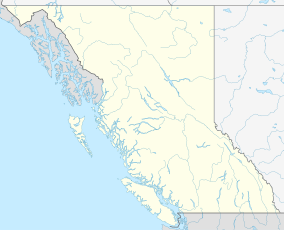Taku River/T'aḵú Téiú' Conservancy is a conservancy located in the Stikine Region of British Columbia, Canada. It was established on June 22, 2012, as a result of the Wóoshtin Wudidaa Atlin Taku Land Use Plan and Taku River Tlingit First Nation Strategic Engagement Agreement. The conservancy protects a large region of pristine wilderness along the Taku River from its confluence with the Nakina and Inklin Rivers to the Canada–United States border] with Alaska.[2]
| Taku River/T'aḵú Téiú' Conservancy | |
|---|---|
| Location | Stikine Region, British Columbia, Canada |
| Nearest city | Juneau |
| Coordinates | 58°46′48″N 133°16′59″W / 58.780°N 133.283°W |
| Area | 80,465 ha (310.68 sq mi) |
| Designation | Conservancy |
| Established | June 22, 2012 |
| Governing body | BC Parks, Taku River Tlingit First Nation |
| Website | Taku River Conservancy |
Name origin
editGeography
editTaku River Conservancy covers 80,465 ha (198,830 acres) of pristine wilderness along the entire length of the Taku River Valley, excluding a large area around the unincorporated locality of Tulsequah. The conservancy borders the Nakina – Inklin Rivers/Yáwu Yaa Conservancy to the northeast and Tongass National Forest of Alaska to the southwest.
Bishop Falls, one of the highest waterfalls in Canada, is a prominent feature along the southeastern sloep valley.[3]
The conservancy also protects King Salmon Lake, a small lake located at the headwaters of King Salmon Creek.[4] The creek the longest tributary of the Taku River protected by the conservancy.
See also
editReferences
edit- ^ "Protected Planet | Taku River/T'aku Teix' Conservancy". Protected Planet. Retrieved 2020-11-05.
- ^ a b Environment, Ministry of. "Taku River/T'aḵú Téiú' Conservancy - BC Parks". bcparks.ca. Retrieved 2020-11-05.
- ^ "Bishop Falls, British Columbia, Canada - World Waterfall Database". www.worldwaterfalldatabase.com. Retrieved 2020-11-05.
- ^ "King Salmon Lake - BC Geographical Names". apps.gov.bc.ca. Retrieved 2020-11-05.
